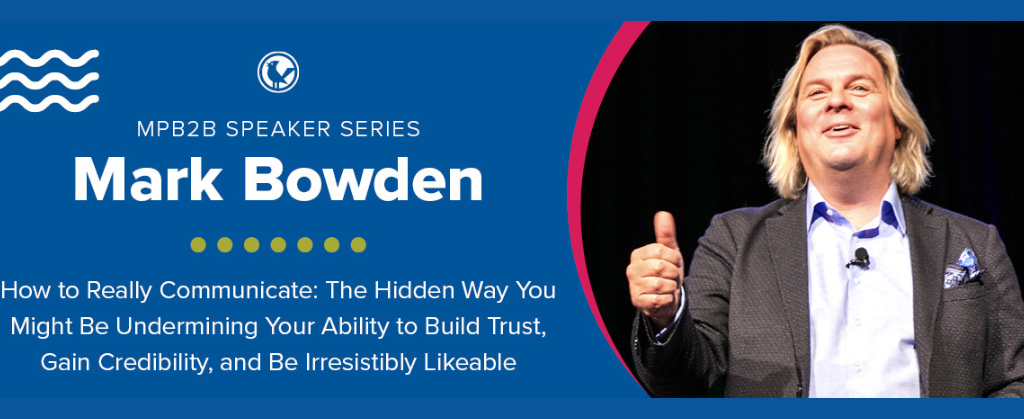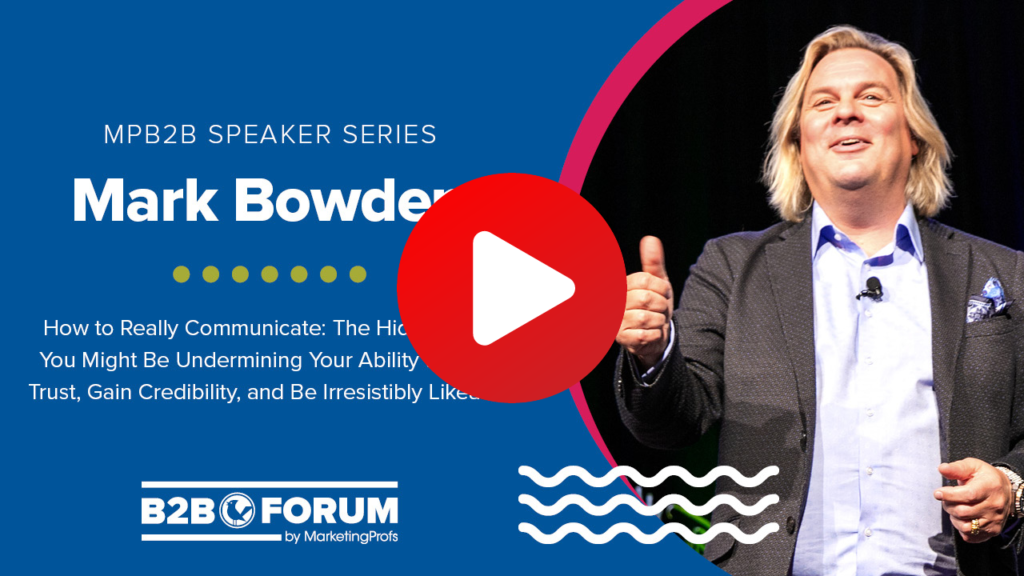
Here’s the bad news.
Despite your best efforts… your customers, your coworkers, and even your friends and family will judge you.
They’ll distort the things you say.
But there’s good news.
Their judgment—and the resulting distortions—can either be negative about you, or positive.
And with the right cues, you can sway their judgment towards the positive. Towards your own benefit.
Mark Bowden is a body language expert and author of Winning Body Language: Control the Conversation, Command Attention, and Convey the Right Message without Saying a Word.
And in this entertaining clip, Mark explains why this judgment happens, and provides ideas to sway other people’s judgment of you.
Watch the clip from Mark’s B2B Forum 2023 keynote or read the transcript below. B2B Forum returns to Boston in November 2024. Tickets are available now.

You’ve already decided whether you like me or not, haven’t you? Yeah. Yeah.
You’ve already judged me. Yeah, yeah, exactly.
I’m getting some thumbs up. That’s really good. That’s okay… in this country.
(In other countries, [thumbs up] will get you into a lot of trouble, by the way… as will [the a-ok hand sign], by the way. Okay.)
That’s all the help you needed! Goodbye everybody! That stopped an international incident. Yeah.
Look, you’ve already judged me. That’s okay. That’s okay.
I judge you. You judge me. You do it in a fraction of a second. We all do it to each other.
Listen, we’d never be able to get on with life if we didn’t judge situations instantly.
Now, I want you to tune into that judgment about me, because you’ve got a little voice in your head talking about me right now. Can you hear it? Yeah. Little voice. Yeah. I’m up here talking, behaving. Yeah. And there’s a little voice in your head.
And maybe it’s got an upward inflection to it. Listen. Listen to its tonality right now. Maybe it’s going, “oh, oh, oh, okay. Oh, alright. I have no idea what’s going on, but it’s going to get better.”
Maybe it’s optimistic about me right now.
Or maybe it’s got a downward intonation about it. It’s going, “oh, oh, no. Oh dear. If only Anne had stayed on, it would be much better.” Yeah.
So look, it’s either optimistic about me right now, or pessimistic about me right now, or some gradation in between.
But we call that behavior the “approach or avoid response.”
You make judgments—about everything in the world around you—most instantly.
And you do that based on, mainly, what you are seeing in that environment. Partially what you are hearing in that environment. And very little about what you are being told about that environment.
Language has very little to do with those snap judgments that you make.
And so, on I come. I start behaving in front of you. And your approach or avoid response starts to happen immediately.
Am I “benefit” to you? Or am I “threat” to you?
(Does this make sense to you all, immediately?)
Now, that is being done in a part of your brain that, I would say, is about 500 million years old. We call it the R-complex, or the reptilian brain, the primitive brain. It’s called a whole bunch of different names.
It doesn’t really matter what you call it, but mine is exactly the same as yours.
It doesn’t matter where you are from on the planet. We’ve inherited exactly the same DNA coding for how to respond to that environment around us.
So, on I come. You start looking at me. You look at my behavior. What’s my body doing? What are my hands doing? What’s my face doing? How am I dressed? What context am I in? You hear the music of my voice, the tonality of it, and you very little listen to what I have to say.
You mainly judge me based on my behavior.
I would say there are four categories that you get to put me into based on my behavior. These are really important for us. I’m going to go through these four categories for us.
(First of all, make sense?)
Okay, so look.
Lovely introduction from my friend Matt. Okay? Which was a piece of propaganda that I wrote. Yeah, it’s a warm referral that I wrote for myself. And I get somebody of status up here to kind of say it. He’s got an English accent, so it’s all going well. Okay? We spent a lot of money—the English spent a lot of money—making sure that when you hear this noise [you think], “the people in charge are here.” Okay?
So, guy comes on. English accent. Reads a piece of propaganda that I wrote.
That’s rather like your lives as well: you get introduced to people, you get into the meeting.
But then I actually get into the meeting and you look at my behavior. Your unconscious mind takes about 1/50th of a second to make that snap judgment about me.
And it says to itself, “is Mark a friend to me? If I spend time with him, am I going to come out with more than I went in with? Am I going to profit from him?”
Now, if that happens, a message is sent from that old brain—500 million years old—to a newer part of the brain called the neocortex.
(Neocortex, new brain. It’s about 200,000 years old. Very new. Super expensive to run. It’s like a very new, very expensive new employee. And so it’s taking a third of every breath that you take to run that neocortex… which also means it’s never switched on as much as you would hope.)
A message is sent from that old brain to the new brain saying, “go and get me all the data that proves Mark is a friend.” Not all the data that proves I’m a friend and disproves it and anything else in between.
You now have a positive cognitive bias around me.
And so now, with your neocortex, you start listening to the words I have to say to you.
But you only hear the good stuff.
And if there’s bad stuff, you do what we call distortion and deletion. You monkey around with it to make it good.
And if you have no idea what I’m talking about—which can happen…
(I do this talk all over the world. Sometimes English is not the first language. And I know that’s probably not the case for you, but you might go into meetings and you are talking, maybe, mathematics to people. Not their first language.
Maybe you’re going into meetings and you’re talking strategy to people. Not their first language, potentially.
You’re coming up with new ideas that they’ve never met before. The brain hates new ideas! It likes to make it like something it’s already met and seen and trusts. If it’s totally new, it gets confused. It’s in a confused world.)
So I do this [presentation] all over the world.
And people come up to me afterwards and they say, “oh, I love it when you said X.”
And I think to myself, “I never said that. I know I never said that. I don’t use those words. I haven’t thought of that concept. I’ve never thought of that idea.”
In fact, much of what you’re hearing today is stuff that other people said I’ve said, and I just took it and put it together in some kind of speech.
So if I hit that category of friend for you, yes, you are going to make up words and content that fit your assumptions. Does this make sense to everybody so far?
Second category. Okay, lovely introduction by my friend Matt, piece of propaganda that I wrote. On I come. I start behaving in front of you and instantly your brain goes, “is Mark a threat to me? Is he a predator? If I spend time with him, am I going to come out with less than I went in with? Is there risk?”
If that happens, a message is sent from the old brain to the new brain saying, “go and get me all the data that proves Mark is a threat.” Not all the data that proves it and disproves it and everything else in between.
You now have a negative cognitive bias around me.
And so now you only start listening to the bad stuff.
And if there’s good stuff, you distort and delete and make it bad.
And if you have no idea what I’m talking about, what do you think you do?
You make up the worst story you possibly can about it.
Which is why, you’ve had all kinds of conversations in your life—in your life, in your business, friends, colleagues, community, family even—where you are giving them the gold. Giving them your best attention. You are giving them your best help. You have the best strategy. You have the best numbers for them.
And they’re coming back to you going, “yeah, but this is terrible. This is bad. And you said this. And you meant this by it.”
And you’re saying, “well, no, that’s not what the numbers say. That’s not what I said.”
And you think to yourself, “well, I don’t even use those words and I wasn’t even thinking that thing. And I don’t even intend that.” And now you’re thinking, “oh no, they’re just making this stuff up.”
And they are! They’re making it up. But they’re making it up to fit their first assumption about you.
And that’s why today, you are going to learn the clear signals that you might be putting off—not on purpose, accidentally—that unconsciously trigger people into putting you into that predator category.
And then sending you back to get more numbers, more strategy, more ideas—because those ones weren’t good enough. They were bad.
We’ve all had those situations.
You’re like, “go and get me more numbers! Go and get me more numbers.”
It’s like, “those are the only numbers. I mean, I’ll make some up…”
Published 12/27/23
B2B Forum is packed with marketing insights, strategies, and tactics taken from the real world experience of over forty industry experts, packaged into context you can actually put to use.
Join us in Boston for B2B Forum 2024 this coming November 12-14, 2024. Early buyers get B2B Forum tickets at their lowest rate, and discounted hotel rooms are available while they last.